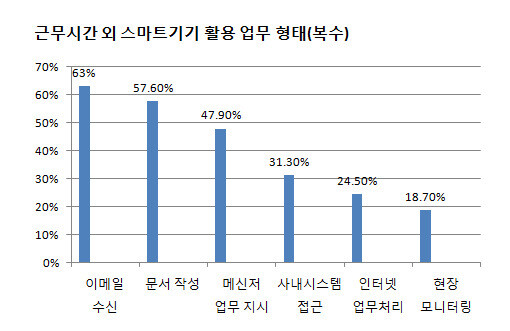hankyoreh
Links to other country sites 다른 나라 사이트 링크
Overburdened workers seeking the right to remain off their smartphones after hours
“Kim Ji-yeon,” 44, is chief editor for a publishing company. She frequently works outside the office, and mainly uses the messenger NateOn to stay in contact with colleagues. A designer may post a draft for a book cover on the service, while other employees add comments. Kim then looks at the draft and replies, then writes a final message, which may come outside of working hours.
“It’s so much easier to give orders now because I can send a message any time I think of some direction I want to give,” she explained.
In contrast, “Lee Soo-mi,” a 29-year-old employee at a small business, bristles at the orders that come to her over Kakao Talk when she has gone home for the day. Her department director leaves messages in the group chat room there - even when the issues have nothing to do with her job. Because some of the orders may be for her, she doesn’t have the option of turning off the alert.
“I feel like I’m always ‘on call.’ I can’t ever rest easy,” she complained.

As more and more workers are handling duties after working hours over smartphones, tablets, and other smart devices, there are growing calls for overtime compensation. The phenomenon has also led to a bill being presented in the National Assembly to prevent supervisors from giving work orders by text or social networking services after working hours.
On June 22, the Korea Labour and Society Institute organized a forum titled “Workers Fearing Kakao Talk.” In a presentation titled “Labor Law Issues with the Use of Smart Devices for Work,” Korea Labor Institute associate research fellow Kim Ki-seon noted survey results showing seven out of ten workers engaged in work over smart devices outside of working hours. Workers averaged 86.24 minutes more after-hours work on weekdays on smart devices, and 95.96 minutes on Sundays and holidays. The numbers translate to over 11 hours (677 minutes) a week.
The results were made on a survey of 2,402 male and female wage earners in manufacturing and major services.
“The Labor Standards Act and precedent have regarded ‘on call’ periods in which [employees] are under an employer’s direction and oversight to be working hours,” Kim noted.
“If workers have carried out duties in their off time over smart devices under the orders or tacit approval of their employers, then those should be viewed as working hours,” Kim added.
In France and Germany, times outside of working hours when employees have their mobile phones on are designated as “on call” periods, with terms on their use and compensation - in terms of pay and time off - stated in collective agreements. In France, compensation is proportional to on call time, with one hour equivalent to 30% of hourly pay. In Germany, it is prohibited as a rule for companies to call employees on their mobile phone or contact them by messenger or email about work outside of working hours. Volkswagen uses technical blocks on work-related communication during time off: work-related smartphone email capabilities are halted 30 minutes after the workday ends and resume 30 minutes before the start of the work the next day.
A debate over the right to remain offline after work is expected in South Korea as well. The opposition Minjoo Party of Korea lawmaker Shin Kyung-min sponsored an amendment to the Labor Standards Act on June 22 that would ban the use of Kakao Talk for work-related matters after working hours. The terms of the bill would disallow violations of workers’ privacy through the issuance of orders by mobile phone or text messenger outside the working hours specified by the Labor Standards Act.
“All workers have the right to be disconnected after work,” Shin said. “We need to amend the law to respect and guarantee workers’ privacy.”
By Jeong Eun-joo, staff reporter
Please direct questions or comments to [english@hani.co.kr]

Editorial・opinion
![[Column] Park Geun-hye déjà vu in Yoon Suk-yeol [Column] Park Geun-hye déjà vu in Yoon Suk-yeol](https://flexible.img.hani.co.kr/flexible/normal/500/300/imgdb/original/2024/0424/651713945113788.jpg) [Column] Park Geun-hye déjà vu in Yoon Suk-yeol
[Column] Park Geun-hye déjà vu in Yoon Suk-yeol![[Editorial] New weight of N. Korea’s nuclear threats makes dialogue all the more urgent [Editorial] New weight of N. Korea’s nuclear threats makes dialogue all the more urgent](https://flexible.img.hani.co.kr/flexible/normal/500/300/imgdb/original/2024/0424/7317139454662664.jpg) [Editorial] New weight of N. Korea’s nuclear threats makes dialogue all the more urgent
[Editorial] New weight of N. Korea’s nuclear threats makes dialogue all the more urgent- [Guest essay] The real reason Korea’s new right wants to dub Rhee a founding father
- [Column] ‘Choson’: Is it time we start referring to N. Korea in its own terms?
- [Editorial] Japan’s rewriting of history with Korea has gone too far
- [Column] The president’s questionable capacity for dialogue
- [Column] Are chaebol firms just pizza pies for families to divvy up as they please?
- [Column] Has Korea, too, crossed the Rubicon on China?
- [Correspondent’s column] In Japan’s alliance with US, echoes of its past alliances with UK
- [Editorial] Does Yoon think the Korean public is wrong?
Most viewed articles
- 1[Column] Park Geun-hye déjà vu in Yoon Suk-yeol
- 2Will NewJeans end up collateral damage in internal feud at K-pop juggernaut Hybe?
- 3N. Korean hackers breached 10 defense contractors in South for months, police say
- 4[Guest essay] The real reason Korea’s new right wants to dub Rhee a founding father
- 5Up-and-coming Indonesian group StarBe spills what it learned during K-pop training in Seoul
- 6[Editorial] Japan’s rewriting of history with Korea has gone too far
- 7Why Korea shouldn’t welcome Japan’s newly beefed up defense cooperation with US
- 8Terry Anderson, AP reporter who informed world of massacre in Gwangju, dies at 76
- 9Thursday to mark start of resignations by senior doctors amid standoff with government
- 10Senior doctors cut hours, prepare to resign as government refuses to scrap medical reform plan